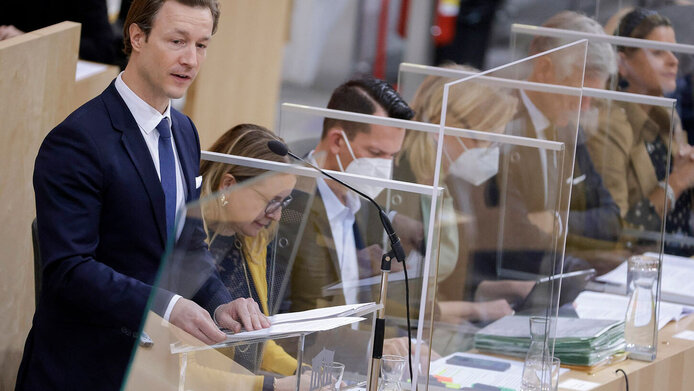Balancing the budget discourse

National budgets are often referred to as “policy cast into figures”. They balance expected inflows and revenues, from taxes for instance, with the maximum level of admissible disbursements and expenditures, for example for transfer payments and human resources. In Austria, the draft budget is traditionally presented by the minister of finance at the end of the year for the coming year. The government, parliament and the Federal President listen attentively – ever since 2008 so does political scientist Johannes Karremans, who has been paying close attention to how governments justify revenues and expenditures. “In my research I am interested in how national governments can be responsive to the demands of their constituents in the face of increasing international economic interdependence and at the same time meet the requirements of international institutions such as the European Union.” With the support of the Austrian Science Fund FWF, Karremans has compared the positions the governments of the EU member states Austria, Germany, Italy, France and Spain have taken in their budgets between the poles of “responsiveness” (to voters) and “responsibility” (to institutions) between 2008 and 2020.
A binding fiscal compact
In the wake of the financial crisis, the EU tightened the reins between 2011 and 2013 and adopted the Fiscal Compact that required the member states to strictly limit their deficits. In 2011, the European Semester was introduced in order to coordinate economic and budgetary policy. In this context the European Commission also examines the national budgetary and reform programmes. For his post-doctoral project at the University of Salzburg, Johannes Karremans presented the hypothesis that the new rules would lead to stricter fiscal regimes and more spending discipline in the countries concerned. As a consequence, they would not have the opportunity to be “responsive”. Austria and Germany were among the countries that had already defined spending discipline as part of their growth strategy, while Italy, France and Spain had greater difficulties in complying.
The budget speech is not a mere contribution to a debate, but a well-prepared line of arguments addressed not only to parliament, but also to the European Commission, the media, the financial market, etc. “I code the budget speeches sentence by sentence, and the method I have developed allows me to compare national budget plans. While it is impossible to capture what governments really think, my method can disclose the criteria that governments employ when presenting their policies to parliament for evaluation. The method is based on comparison,” explains Karremans. In addition, he analyses government programmes and ultimately measures to what extent a government is leaning towards either responsiveness or responsibility in the budget discourse.
Discipline first, then a focus on voter satisfaction
Between 2009 and 2013, the governments of the five countries actually focused their justifications on fiscal discipline and the need to reduce debt. In all five countries these policies ultimately resulted in great dissatisfaction among voters. “From 2014 onwards, albeit motivated by different issues, all five countries returned to a policy of responsiveness, always aligned to the respective party ideology. The European Commission, for its part, has also been moving away from the austerity principle and relaxing the guidelines on government spending. With the coronavirus pandemic – under the motto of 'whatever the cost' – the whole paradigm has shifted even further,” notes Karremans in talking about the respective developments.
An important moment in the democratic cycle
Focusing as he does on the budget speech, Karremans is the only scholar “to look at this moment between elections in the cycle of a democracy, where governments justify their budget policies – either by making promises to constituents or by invoking responsibility for the national budget. In concert with all other scholarly perspectives, this is how we put together a portrait of democracy.” Karremans sees Austria as having acted in a relatively balanced way between 2012 and 2018. In his view, the country has been guided by both institutional requirements and constituency needs even during the euro crisis.
“There is less inequality in Austria than in Germany. I see the reason for this in government action during the euro crisis, where a balanced course was pursued between fiscal discipline and attention to social concerns. In Germany, on the other hand, budgetary policy between 2009 and 2013 was almost entirely characterised by austerity, and growing inequality was treated as a mere trifle in the budget discourse.” Within ten years, all five EU countries under study shifted from reducing deficits for the benefit of robust financial markets that finance spending to larger deficits through government spending as an investment in future growth. This strategy has the secondary benefit of giving the governments more elbow room for keeping election promises.
Personal details
Johannes Karremans is a Research Fellow at the European University Institute in Florence (Italy). Previously, he was a postdoctoral fellow at the Department of Political Science at the University of Salzburg and the principal investigator of a Lise-Meitner project funded by the Austrian Science Fund FWF on the comparison of budget discourse in the Eurozone. He completed his PhD at the European University Institute (2017), his Master's at the Vrije Universiteit Brussel (2012) and his Bachelor's degree at the VU Amsterdam.
Publications
Karremans J.: This Time Wasn’t Different: Responsiveness and Responsibility in the Eurozone between 2007 and 2019, in: Journal of Common Market Studies 2021
Karremans J., Kaltenleithner J.: Is Austrian budgetary policy still “political”? A cross-time comparison of budget speeches, in: Austrian Journal of Political Science, Vol. 50, 2021
Garzia D., Karremans J.: Super Mario 2: comparing the technocrat-led Monti and Draghi governments in Italy, in: Contemporary Italian Politics, Vol. 13, 2021
Karremans J.: Political alternatives under European economic governance: evidence from German budget speeches (2009–2019), in: Journal of European Public Policy, Vol. 28, 2020





